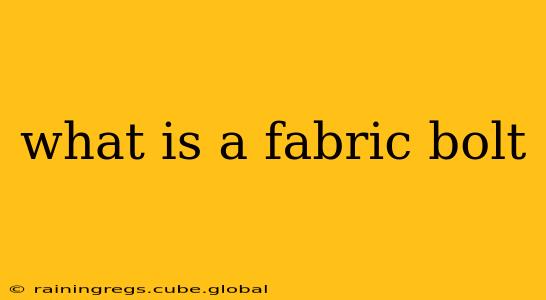A fabric bolt is a fundamental unit in the textile industry, representing a large, rolled-up quantity of fabric. Think of it like a giant roll of wrapping paper, but instead of paper, it's filled with yards and yards of woven or knitted fabric. Understanding what a fabric bolt is crucial for anyone involved in the textile trade, from designers and manufacturers to retailers and consumers.
This comprehensive guide will delve into the specifics of fabric bolts, covering everything from their size and construction to their uses and importance in the industry.
What Does a Fabric Bolt Look Like?
Fabric bolts typically consist of a substantial roll of fabric wound tightly onto a cardboard or plastic core. The core provides structural support and makes handling and storage easier. The fabric is tightly wound to prevent wrinkling and damage during transport and storage. The outer layer often features labels indicating the type of fabric, its color, its width, and the total yardage contained within the bolt.
How Big is a Fabric Bolt?
The size of a fabric bolt varies considerably depending on the type of fabric and the manufacturer's specifications. However, some common characteristics include:
- Yardage: A bolt can contain anywhere from 50 to 100 yards, though larger quantities are not uncommon, particularly for bulk orders.
- Width: The width is generally consistent throughout the bolt and usually ranges from 45 to 60 inches, but can vary based on the fabric type. This width is essential in calculating how much fabric is needed for a particular garment or project.
What are Fabric Bolts Used For?
Fabric bolts are the primary form in which fabric is sold and distributed throughout the textile supply chain. Their uses include:
- Manufacturing: Large-scale clothing manufacturers purchase fabric bolts in bulk to produce garments and other textile products.
- Retail: Fabric stores sell portions of bolts to individuals and smaller businesses for various sewing and craft projects.
- Wholesale: Fabric wholesalers distribute bolts to retailers and manufacturers, acting as a crucial link in the supply chain.
- Design and Development: Fashion designers and sample makers utilize fabric bolts to create prototypes and samples for new collections.
Why are Fabric Bolts Important?
The use of fabric bolts offers several key advantages within the textile industry:
- Efficient Storage: Bolts provide a compact and efficient way to store large quantities of fabric, minimizing storage space requirements.
- Protection: The tight winding protects the fabric from damage, dust, and moisture.
- Easy Transportation: Bolts are easy to transport and handle using standard material handling equipment.
- Quality Control: The consistent unwinding from a bolt allows for more uniform quality control throughout the production process.
What are the different types of fabric bolts?
The term "fabric bolt" is quite broad. The specific type of bolt will depend on the fabric itself. You might encounter bolts of:
- Cotton: A natural fiber known for its softness and breathability.
- Polyester: A synthetic fiber valued for its durability and wrinkle resistance.
- Silk: A luxurious natural fiber known for its smoothness and sheen.
- Wool: A natural fiber that provides warmth and insulation.
- Linen: A natural fiber that's strong, durable, and has a slightly rough texture.
How much does a fabric bolt cost?
The cost of a fabric bolt varies drastically depending on factors like the type of fabric, its quality, the yardage, and the supplier. Prices can range from a few hundred dollars to several thousand dollars for a single bolt.
Where can I buy a fabric bolt?
Fabric bolts can be purchased from a variety of sources, including:
- Online retailers: Many online stores specialize in selling fabrics in bulk, offering a wide selection of options.
- Fabric stores: Local fabric stores are another good option, often allowing customers to inspect the fabric before purchase.
- Wholesale suppliers: These suppliers cater to larger-scale buyers, such as manufacturers.
This detailed exploration of fabric bolts should provide a comprehensive understanding of their importance within the textile industry. From their physical characteristics to their various applications, fabric bolts represent a critical component of the textile supply chain, essential for efficient production and distribution.
